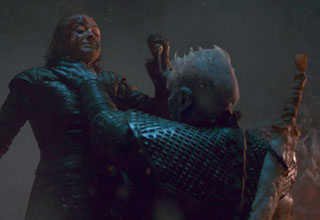Don't Ask Jack
Nobody knew where the toy had come from, which great-grandparent or distant aunt had owned it before it was given it to the nursery.
It was a box, carved and painted in gold and red. It was undoubtedly attractive and, or so the grown-ups maintained, quite valuable—perhaps even an antique. The latch, unfortunately, was rusted shut, and the key had been lost, so the Jack could not be released from his box. Still, it was a remarkable box, heavy and carved and gilt.
The children did not play with it. It sat at the bottom of the old wooden toy box, which was the same size and age as a pirate's treasure chest, or so the children thought. The Jack-in-the-Box was buried beneath dolls and trains, clowns and paper stars and old conjuring tricks, and crippled marionettes with their strings irrevocably tangled, with dressing-up clothes (here the tatters of a long-ago wedding dress, there a black silk hat, crusted with age and time) and costume jewellery, broken hoops and tops and hobby-horses. Under them all was Jack's box.
The children did not play with it. They whispered among themselves, alone in the attic nursery. On grey days when the wind howled about the house and rain rattled the slates and pattered down the eaves, they told each other stories about Jack, although they had never seen him. One claimed that Jack was an evil wizard, placed in the box as punishment for crimes too awful to describe; another (I am certain that it must have been one of the girls) maintained that Jack's box was Pandora's Box and he had been placed in the box as guardian to prevent the bad things inside it from coming out once more. They would not even touch the box, if they could help it, although when, as happened from time to time, an adult would comment on the absence of that sweet old Jack-in-the-Box, and retrieve it from the chest, and place it in a position of honour on the mantelpiece, then the children would pluck up their courage and, later, hide it away once more in the darkness.
The children did not play with the Jack-in-the-Box. And when they grew up and left the great house, the attic nursery was closed up and almost forgotten.
Almost, but not entirely. For each of the children, separately, remembered walking alone in the moon's blue light, on his or her own bare feet, up to the nursery. It was almost like sleepwalking, feet soundless on the wood of the stairs, on the threadbare nursery carpet. Remembered opening the treasure chest, pawing through the dolls and the clothes and pulling out the box.
And then the child would touch the catch, and the lid would open, slow as a sunset, and the music would begin to play, and Jack came out. Not with a pop and a bounce: he was no spring-heeled Jack. But deliberately, intently, he would rise from the box and motion to the child to come closer, closer, and smile.
And there in the moonlight, he told them each things they could never quite remember, things they were never able entirely to forget.
The oldest boy died in the Great War. The youngest, after their parents died, inherited the house, although it was taken from him when he was found in the cellar one night with cloths and paraffin and matches, trying to burn the great house to the ground. They took him to the madhouse, and perhaps he is there still.
The other children, who had once been girls and now were women, declined, each and every one, to return to the house in which they had grown up; and the windows of the house were boarded up, and the doors were all locked with huge iron keys, and the sisters visited it as often as they visited their eldest brother's grave, or the sad thing that had once been their younger brother, which is to say, never.
Years have passed, and the girls are old women, and owls and bats have made their homes in the old attic nursery, rats build their nests among the forgotten toys. The creatures gaze uncuriously at the faded prints on the wall, and stain the remnants of the carpet with their droppings.
And deep within the box within the box, Jack waits and smiles, holding his secrets. He is waiting for the children. He can wait for ever.






3 Comments